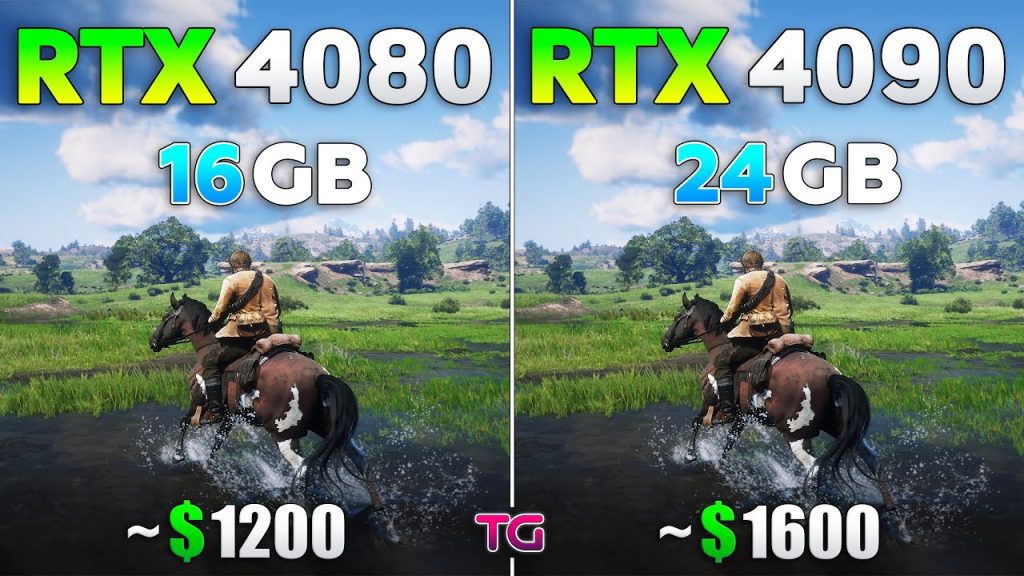The Battle of 4080 vs. 4090: Unveiling the Ultimate CPU Showdown
CPUs play a significant role in modern computing, powering everything from personal computers to servers. The competition between CPU manufacturers is fierce, with each new release aiming to outperform its predecessors and competitors. In this article, we will compare and contrast the performance, features, and specifications of the highly anticipated 4080 and 4090 CPUs. By understanding the capabilities and advancements of these CPUs, users can make informed decisions when choosing the best option for their computing needs.

Understanding the 4080 CPU
1.1 Overview of the 4080 CPU
The 4080 CPU, released by an industry-leading manufacturer, is targeted towards high-performance computing enthusiasts and professionals. It boasts several key features and improvements that set it apart from its predecessors.
1.2 Performance Analysis
Performance tests and benchmark scores of the 4080 CPU have shown impressive results, demonstrating its capabilities in handling demanding tasks and providing a smooth user experience. When compared to its direct competitors, the 4080 CPU stands out in terms of raw processing power and multitasking capabilities.
1.3 Technical Specifications
The 4080 CPU operates at a high clock speed, has a significant core count, and boasts a large cache size. Its advanced architecture and power-efficient design contribute to its overall performance and efficiency. These technical specifications make the 4080 CPU a formidable option for users seeking top-of-the-line computing power.
1.4 Pros and Cons
The 4080 CPU comes with several advantages that make it an attractive choice for users. Its enhanced multitasking capabilities allow for smooth performance even when running multiple resource-intensive applications simultaneously. Additionally, the improved power efficiency of the 4080 CPU results in lower energy consumption and reduced heat generation, contributing to a more sustainable computing experience.
However, it’s important to consider the potential drawbacks or limitations of the 4080 CPU. One potential downside is the compatibility issue with existing motherboards. Users may need to upgrade their motherboard to take full advantage of the 4080 CPU’s features and performance. Additionally, the 4080 CPU may come with a higher price tag compared to other CPUs in the market, making it less accessible for budget-conscious users.
Exploring the 4090 CPU
2.1 Overview of the 4090 CPU
The 4090 CPU, manufactured by a renowned industry leader, is designed to cater to the needs of high-performance computing enthusiasts and professionals. It introduces several advancements and features that set it apart from its predecessors, making it a highly anticipated release in the CPU market.
2.2 Performance Analysis
Performance tests and benchmark scores of the 4090 CPU have showcased its exceptional capabilities in delivering superior performance across various tasks and applications. When compared to its direct competitors, the 4090 CPU stands out in terms of gaming performance, offering smoother gameplay, faster load times, and improved graphics rendering.
2.3 Technical Specifications
The 4090 CPU boasts an impressive clock speed, a substantial core count, and a generous cache size. Its advanced architecture and power-efficient design contribute to its exceptional performance and energy efficiency. These technical specifications make the 4090 CPU a powerhouse for demanding tasks such as video editing, 3D rendering, and AI-driven applications.
2.4 Pros and Cons
The 4090 CPU comes with several advantages that make it an appealing choice for users. Its improved gaming performance allows for a more immersive and enjoyable gaming experience, with higher frame rates and smoother gameplay. Additionally, the advanced AI capabilities of the 4090 CPU enable faster and more efficient processing of AI-driven tasks, making it a valuable tool for professionals in fields such as machine learning and data analysis.
However, it’s important to consider potential drawbacks or limitations of the 4090 CPU. One potential downside is its higher power requirements, which may necessitate a robust cooling system and a compatible power supply. Additionally, users should check for compatibility with their existing motherboards, as some may require an upgrade to fully utilize the features and performance of the 4090 CPU.
Comparison and Verdict
3.1 Performance Showdown
When comparing the performance of the 4080 and 4090 CPUs, both deliver exceptional results in their respective areas of focus. The 4080 CPU excels in multitasking and general computing tasks, providing smooth performance and efficient resource management. On the other hand, the 4090 CPU shines in gaming and AI-driven applications, offering superior graphics rendering, faster load times, and advanced AI capabilities.
Ultimately, the choice between the 4080 and 4090 CPUs depends on the specific needs and preferences of the user. If multitasking and general computing performance are the primary requirements, the 4080 CPU would be an excellent choice. However, for users focused on gaming and AI-driven tasks, the 4090 CPU would provide the necessary power and features for an exceptional experience.
3.2 Feature and Specification Comparison
In terms of technical specifications, the 4080 CPU and 4090 CPU have notable differences. The 4080 CPU offers a high clock speed, a significant core count, and a generous cache size, making it ideal for multitasking and general computing. On the other hand, the 4090 CPU boasts a comparable clock speed and core count but may have a larger cache size and advanced AI capabilities, making it a better choice for gaming and AI-driven applications.
These differences in specifications directly impact the user experience and suitability for different use cases. Users seeking a well-rounded CPU for everyday computing tasks may find the 4080 CPU to be a perfect fit. However, those focused on gaming, AI, and other resource-intensive applications may benefit from the advanced features and capabilities of the 4090 CPU.
FAQs: Frequently Asked Questions
What is the main difference between the 4080 and 4090 CPUs?
The main difference between the 4080 and 4090 CPUs lies in their focus and target market. The 4080 CPU is designed for high-performance computing and multitasking, while the 4090 CPU is geared towards gaming, AI-driven applications, and advanced graphics rendering.
Which CPU is better for gaming, the 4080 or 4090?
The 4090 CPU is better suited for gaming due to its superior gaming performance, faster load times, and improved graphics rendering capabilities. It offers a more immersive and enjoyable gaming experience compared to the 4080 CPU.
Are the 4080 and 4090 CPUs compatible with existing motherboards?
Compatibility with existing motherboards may vary. It is recommended to check the specifications and requirements of the 4080 and 4090 CPUs and ensure compatibility with the motherboard before making a purchase. Some users may need to upgrade their motherboards to fully utilize the features and performance of these CPUs.
How do the power consumption levels of the 4080 and 4090 CPUs compare?
The power consumption levels of the 4090 CPU may be slightly higher compared to the 4080 CPU due to its advanced features and capabilities. Users should ensure they have a compatible power supply and cooling system to handle the power requirements of the 4090 CPU.
Can the 4090 CPU handle demanding tasks like video editing and 3D rendering?
Yes, the 4090 CPU is well-equipped to handle demanding tasks like video editing and 3D rendering. Its high clock speed, substantial core count, and advanced architecture make it a powerful choice for these resource-intensive applications.
Are there any known issues or limitations with the 4080 and 4090 CPUs?
As with any technology, there may be limitations or issues associated with the 4080 and 4090 CPUs. Users should stay updated with the latest information from the manufacturer and user reviews to be aware of any potential issues or limitations before making a purchase decision.
Will the 4080 and 4090 CPUs support future software updates and advancements?
While future software updates and advancements are dependent on the manufacturer’s support, it is expected that the 4080 and 4090 CPUs will be able to handle future software updates and advancements. However, it is always recommended to check with the manufacturer for the latest information on compatibility and support.
What is the expected pricing range for the 4080 and 4090 CPUs?
The pricing for the 4080 and 4090 CPUs may vary depending on the region and retailer. As high-performance CPUs, they are likely to be positioned in the upper price range compared to other CPUs in the market. Users should check with authorized retailers or the manufacturer for the most accurate pricing information.
How do the 4080 and 4090 CPUs compare to their competitors in terms of value for money?
The value for money of the 4080 and 4090 CPUs depends on the specific needs and requirements of the user. Both CPUs offer exceptional performance and advanced features, but their suitability and value for money will vary based on the intended use. Users should consider their specific needs and compare the features, performance, and pricing of the 4080 and 4090 CPUs with other competitors in the market to make an informed decision.
When will the 4080 and 4090 CPUs be available for purchase?
The availability of the 4080 and 4090 CPUs may vary depending on the region and retailer. It is recommended to check with authorized retailers or the manufacturer for the official release date and availability information.
Here is a table comparing the two cards:
| Specification | RTX 4080 | RTX 4090 |
|---|---|---|
| Shader units | 9728 | 16384 |
| Boost clock | 2.5 GHz | 2.52 GHz |
| Memory | 16 GB GDDR6X | 24 GB GDDR6X |
| Memory bus | 256-bit | 384-bit |
| Memory bandwidth | 720 GB/s | 1008 GB/s |
| Power draw | 450 W | 450 W |
| MSRP | $1199 | $1599 |
As you can see, the RTX 4090 has more shader units, a higher boost clock, more memory, a wider memory bus, and more memory bandwidth than the RTX 4080. This results in a significant performance advantage for the RTX 4090, especially in high-resolution gaming and demanding workloads like video editing and 3D rendering.
Conclusion
The battle between the 4080 and 4090 CPUs showcases the continuous advancements and competition in the CPU market. While the 4080 CPU excels in multitasking and general computing, the 4090 CPU shines in gaming, AI-driven applications, and advanced graphics rendering. Users should carefully consider their specific needs and preferences to choose the CPU that best suits their requirements. With their impressive performance, advanced features, and technical specifications, both the 4080 and 4090 CPUs offer powerful options for high-performance computing enthusiasts and professionals.
FAQs
- Q: What are the differences between the 4080 and 4090 models?
A:
The 4080 and 4090 models are different versions of a product. The specific differences may vary depending on the context, but they typically refer to updated features, performance improvements, or other enhancements in the 4090 model compared to the 4080 model.
- Q: Which model is more powerful, the 4080 or 4090?
A:
Generally, the 4090 model is expected to be more powerful than the 4080 model. However, the extent of the power difference may depend on the specific product or industry. It is recommended to compare the specifications and performance benchmarks of both models for a more accurate assessment.
- Q: Can I upgrade from a 4080 to a 4090 model?
A:
Upgrading from a 4080 to a 4090 model may be possible depending on the product and its compatibility. It is advisable to consult the manufacturer’s documentation, and product specifications, or reach out to their customer support for accurate information regarding upgrade options.
- Q: Are the 4080 and 4090 models priced differently?
A:
Yes, the pricing of the 4080 and 4090 models can vary. The 4090 model might be priced higher than the 4080 model due to its improved features and performance. It is recommended to check with retailers, manufacturers, or online sources to get the most up-to-date pricing information.
- Q: Which model is more suitable for gaming, the 4080 or 4090?
A:
Both the 4080 and 4090 models can be suitable for gaming, but the 4090 model is likely to offer better gaming performance due to its advancements. However, factors like graphics cards, processors, and other components also play a significant role in gaming performance, so it’s important to consider the overall system configuration.
- Q: Are there any compatibility issues when switching from a 4080 to a 4090 model?
A:
Compatibility issues can arise when switching from a 4080 to a 4090 model, especially if the new model has different form factors, connectors, or requirements. It is crucial to review the product specifications, consult the manufacturer, or seek professional advice to ensure a smooth transition without any compatibility problems.
- Q: Do the 4080 and 4090 models have the same warranty coverage?
A:
The warranty coverage for the 4080 and 4090 models may differ. Manufacturers often provide different warranty periods or terms for different models or product versions. It is recommended to check the specific warranty information provided by the manufacturer or retailer to understand the coverage for each model.
- Q: Can I use the same accessories for both the 4080 and 4090 models?
A:
The compatibility of accessories between the 4080 and 4090 models can vary. While some accessories may be compatible with both models, others might require specific versions or adapters. It is advisable to refer to the product documentation, consult the manufacturer, or check compatibility lists to ensure the accessories are compatible with your desired model.
- Q: Are there any known issues or limitations with the 4080 or 4090 models?
A:
Known issues or limitations can exist with any product, including the 4080 and 4090 models. It is recommended to research user reviews, forums, or official documentation to identify any common issues, limitations, or firmware updates related to the specific models you are considering.
- Q: How can I decide between the 4080 and 4090 models for my specific needs?
A:
To decide between the 4080 and 4090 models, consider your specific requirements, budget, and the significance of the improvements offered by the 4090 model. Compare their specifications, performance benchmarks, and reviews, and consider seeking expert advice if necessary. This evaluation will help you make an informed decision based on your needs




